Don’t Get Trapped: What Are VPN Scams? (And How to Defend Yourself)
The popularity of virtual private networks (VPNs) is growing at a meteoric pace: there are already 1.5 billion users in the world. Such a tremendous spike in VPN users is easy to explain, because VPNs let people browse the Internet safely without being worried about their digital privacy. However, the dark side of this staggering popularity is VPN scams that do the opposite, stealing and exploiting users’ data for malicious purposes. But there’s no reason to panic, as in this article, we will answer your concerning question: what are VPN scams and how can you defend yourself against them?

What is a VPN scam?
A VPN scam typically means a fraudulent VPN service that claims to provide online privacy and security but instead exploits your personal data for financial gain or compromises your privacy. Scammers try to deceive you by offering free or heavily discounted VPN services, only to harvest sensitive information or inject malware software into your device.
There are numerous types of VPN scams and they keep evolving each day. But we would like to focus your attention on the most common ones, so you won’t find yourself in hot water with no VPN, money, and confidence your personal information hasn’t leaked into the wrong hands.
Cracked or resold VPN accounts
Cracked or resold accounts of various VPN services are one of the most blatant yet working scams. Fraudsters offer free or significantly cheaper access to a premium account of a popular VPN service, promising that it will secure your online privacy as if it’s a premium account purchased from the original provider.
Before we delve into a discussion of dangers such VPN fraud can pose to your privacy, we need to say that cracking and then selling premium VPN accounts is illegal as it violates the intellectual property law. In the end, it is basically you buying a stolen product, which is, well, a crime.
When you want to save some money on getting a cracked or used VPN account, you are risking paying more than you would have compared to opting for an official subscription. It’s quite possible that you may come across cracked and “discounted” VeePN accounts, but buying them can harm your privacy. So, whatever VPN service you prefer, we highly recommend you buy a subscription from an official website and never regret money you didn’t save by buying a cracked version. It’s simply not worth it.
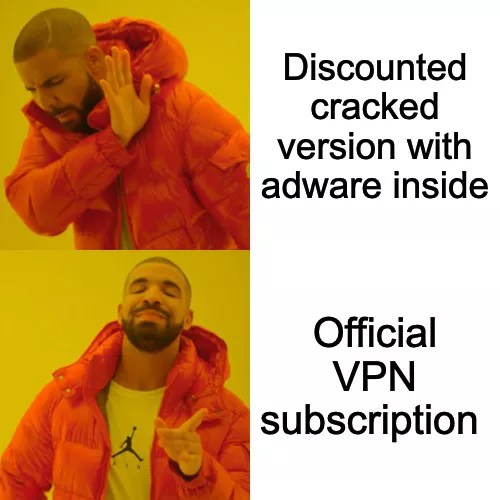
Free VPNs
Probably the most widespread form of VPN app scam. There is no such a thing as free lunch, and this saying applies to free VPN services. You don’t pay anything, but how can a free VPN provider support their service if users don’t pay anything? Something sketchy, don’t you think?
In fact, free VPNs earn on your private information and can: sell it to third parties like advertising agencies, inject malware into your devices, or use your bandwidth for supporting hacker attacks. In such a way, a free VPN service Hola used its Chrome extension to exploit users’ bandwidths to use them in a botnet attack. You don’t pay a cent for a VPN service, but your Internet speed drops down as your device is busy with a botnet attack.
Overall, free VPN services defeat the whole point of virtual private networks. You expose your privacy, potentially infect your device with malware, and get your Internet connection slower than a heavily wounded snail.
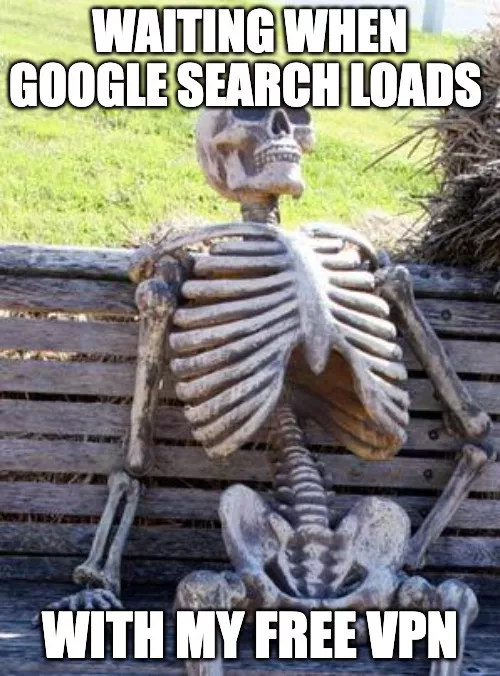
VPNs with vague No Logs policy
VPN scammers often claim to collect no information from you as the first mover to get you into their deceptive service. No Logs policy is a gold standard for VPN products: not collecting any private information is a good way to gain trust of users.
But we live in a world that is far from perfect. A VPN provider may say they don’t collect your private information, but you can’t be sure how this company determines the privacy boundaries. For this case, we recommend reading a VPN’s service fine print to understand what information they do collect despite the No Logs policy. Legitimate VPN providers usually state they collect data that relates to the performance of the service, such as account information, payment history, troubleshooting records, and the like.
Scammers never say clearly what they collect and what they don’t. The whole purpose for them is to make the No Logs policy as vague as possible to make you think that since a service claims adhering to such a standard, they are good guys you can trust your money and personal information with.
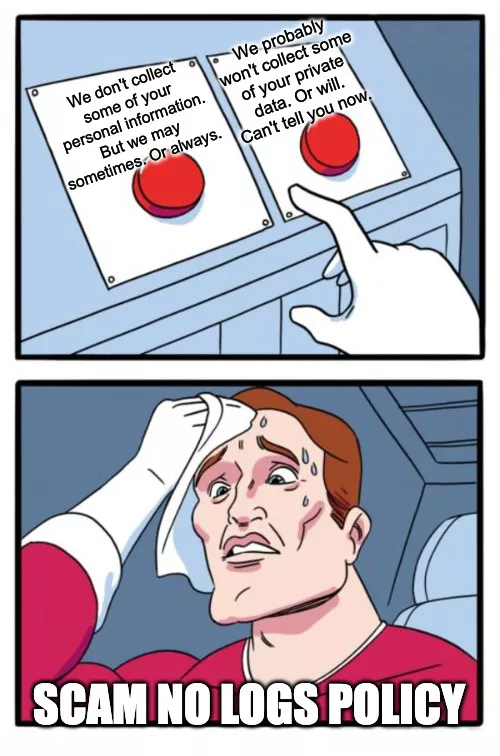
Fake VPN apps and services
While free VPNs at least offer you to download an application that looks like a normal VPN, fake VPNs don’t bother with developing any software at all. You pay and get nothing or download malware that infects your device and leaks your sensitive information. The research says that around 38% of all VPN services are fake and contain malware injections.
Apart from infecting your device and exposing the data, fake VPNs aim to make a buck for their owners. Let’s peek behind the curtains of the following story.
On June 9th, 2017, Apple had to delete the “Mobile Protection: Clean & Security VPN” application from the App Store after the Medium article revealed a scam behind this product. The app promised to protect mobile devices, clean duplicate contacts, and provide a secure Internet connection for 99$ per week. Of course, the app didn’t do this, while unattentive users purchased monthly subscriptions for an eye-watering 400$!
In addition to faking a legitimate service, the scammers did a simple yet clever trick. The app’s description said: “You will be charged 0,99$ for 1 week after 3 days of trial”. As usual, the devil is in the details because 0,99$ means 99 dollars, while 0.99$ is 99 cents. People didn’t notice whether it was a period or a comma. But there is a hundred-times difference!
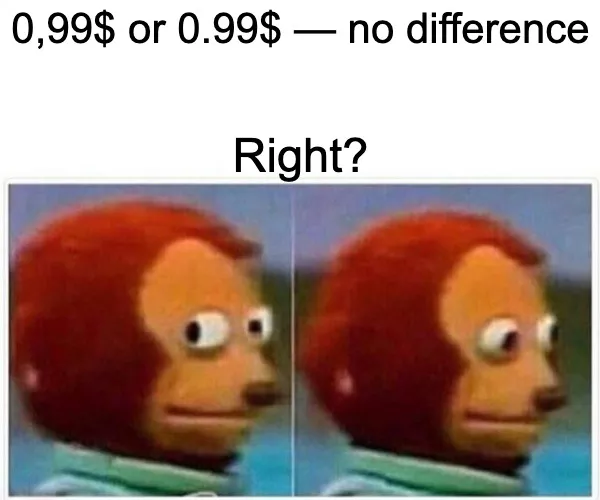
What scammers missed was their English classes. The text on the AppStore’s profile and inside the app had several visible flaws which a legitimate VPN provider would never allow to go live. But the scammers simply didn’t care about it, the comma trick paid off well as around 200 users fell prey to a fake VPN app priced not to the tune of 400$ per month.
What does this story teach us? Several things. First of all, you need to pay attention to how your VPN service looks. A website design should be visually appealing, with error-free copy that makes sense, and without your browser flagging it as insecure. Second, you should carefully read the fine print and pricing details to ensure that it’s totally clear to you how much you’re going to pay. Third, it’s crucial to understand what you are downloading: a genuine VPN installation file or malware pretending to be one. To know how to detect whether malware turns its ugly head towards your device, read our dedicated article.
Paid reviews, awards, comments, and testimonials
When you read a review or user testimonial about a particular VPN service and see tons of praises, unhealthily expressed adoration, and puppy love for the product, it’s probably one big fake. Do a little research to understand when a VPN service was founded to see whether it’s realistic to become that awesome for a period the company has been existing. If the period is too short, it must raise your concerns whether the service is not a scam.
Scam VPNs try to create an image of a super popular and trusted service by paying for deliberately positive reviews and testimonials while award signs can be simply forged or even made up. Legitimate VPN services usually have objective reviews and don’t get the highest rating from every single user who decided to share their experience of using the product.
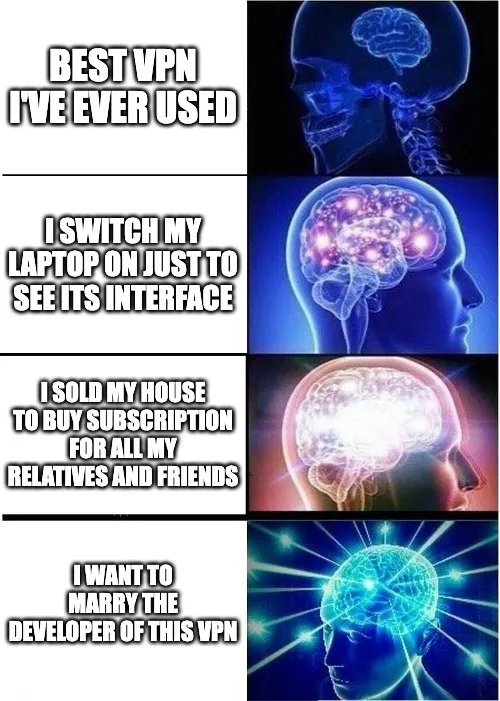
Too-good-to-be true offers
Offering unrealistic benefits such as extra-layer security, low prices, and exceptionally high Internet connection, and such is one of the favorite ways scammers try to lure you into their trap. These empty words usually hide such things as malware embedded inside a VPN app, hidden charges, ad software installed on your device, exposure of your personal information, or everything rolled together into one disgusting scam.
Scammers are ready to promise you anything to trick you. Some cases are so impressively impudent that your eyebrows will jump into the stratosphere when you hear about them. For example, Kasper VPN claimed to provide free access to a mobile version of the famous GTA 5. Needless to say, there is no mobile GTA 5, it’s just a fake claim by Kasper VPN to attract users and exploit their private information.

Unfortunately, almost 75% of VPN services didn’t live up to their advertisement statements and claims, which means you should be very careful cherry-picking a legitimate VPN service. And promises that look way too good to be true are a big red flag you shouldn’t close your eyes on.
VPN services asking for too much personal information
Instead of retrieving your personal information with a malicious VPN app, scammers may also ask for it directly from you at the stage when you sign up for their service. The whole idea of VPN is to protect your privacy, so when a VPN provider asks you to share your address, Social Security number, phone number, or names of your relatives, it means you’re heading towards a scam pitfall.
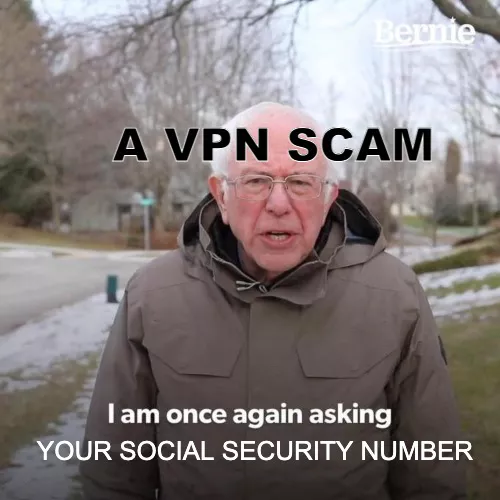
Credit card information and basic contacts like email are an exception as you need to pay for a subscription and create a user account with a VPN service you’ve chosen. In the rest of the cases when a VPN provider asks for too much of your personal information, you’d better not share it as they’re likely to use it against you thereafter.
Tips on how to avoid VPN frauds
Now that you know how VPN scams look, you can avoid those scammy VPNs. We’ve prepared a short list of tips for you to remember:
- Do your research on the service provider. Read carefully the fine print, compare a VPN’s website to similar services, and search for objective reviews on the product.
- Avoid VPNs from 5/9/14 eyes Alliance countries. If a VPN provider is located in a country that is in 5/9/14-Eyes Alliance, it means that this company is obliged to share some of your personal information with the local government, regardless of the No Logs policy it claims to adhere to. So better avoid VPN services from relatable countries to be on the safe side.
- Check the basic features and security protocols. Split tunneling, AES-256 protection, Kill Switch and other basic components of a reliable VPN should be present. Otherwise, you are likely to download an ineffective VPN which possibly contains malware to exploit your device and personal data.
Consider VeePN, a reputable service provider
All in all, VPN frauds are easy to avoid when you know how a legitimate VPN service should look. A reliable provider won’t make unsubstantiated promises or offer premium services for free Also, a to-be-trusted VPN service necessarily includes clear pricing and follows the most recent security standards, while you can easily tell what data the service collects and what it does not. That is why we would like to offer you our VeePN — a legitimate VPN service that doesn’t belong to 5/9/14-Eyes Alliance country, follows a distinct No Logs policy, encrypts data with AES-256 standard, has a Kill Switch feature, protects you from malware with NetGuard, and can even encode your data twice with Double VPN feature.
Be sure to get a legitimate and reputable VPN service right now. Choose a pricing plan and have a 30-day money-back guarantee!
What are VPN scams
No, a Virtual Private Network (VPN) is not a scam in itself. A VPN is a legitimate and widely used tool to enhance online privacy and security.However, it’s important to note that not all VPN services are created equal. There are both reputable and unreliable VPN providers in the market. Some may offer inadequate security, logging user data, or even engaging in deceptive practices. It’s crucial to do thorough research before choosing a VPN service.
A fake VPN, often associated with scam or malicious intent, may claim to provide privacy and security but could actually compromise user data, engage in unauthorized tracking, or expose users to cyber threats. These deceptive services may not implement proper encryption, log sensitive information, or misuse user data for malicious purposes. It’s crucial to choose reputable VPN services to avoid potential risks associated with fake or untrustworthy providers.
Not all free VPNs are scams, but many may have limitations or trade-offs. Some free VPNs generate revenue through ads, while others may log user data for marketing purposes. It’s essential to carefully research and choose a reputable free VPN that transparently discloses its privacy practices and doesn’t compromise user security.
VeePN is freedom
Download VeePN Client for All Platforms
Enjoy a smooth VPN experience anywhere, anytime. No matter the device you have — phone or laptop, tablet or router — VeePN’s next-gen data protection and ultra-fast speeds will cover all of them.
Download for PC Download for Mac IOS and Android App
IOS and Android App
Want secure browsing while reading this?
See the difference for yourself - Try VeePN PRO for 3-days for $1, no risk, no pressure.
Start My $1 TrialThen VeePN PRO 1-year plan







